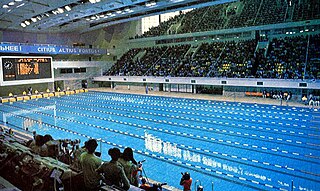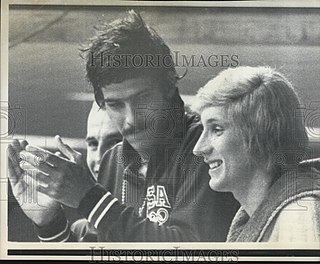
Swimming has been a sport at every modern Summer Olympics. It has been open to women since 1912. At the Olympics, swimming has the second-highest number of medal-contested events.

The men's 200 metre freestyle event at the 1976 Summer Olympics took place on July 19 at the Olympic Pool, Montreal. There were 55 competitors from 33 nations, with each nation having up to three swimmers. The medals were swept the United States, the only time there has been a medal sweep in the men's 200 metre freestyle. Bruce Furniss took gold, John Naber silver, and Jim Montgomery bronze. It was the second consecutive and third overall victory by an American swimmer.

The men's 200 metre freestyle event at the 1992 Summer Olympics took place on 26 July at the Piscines Bernat Picornell in Barcelona, Spain. There were 55 competitors from 39 nations, with each nation having up to two swimmers. The event was won by Yevgeny Sadovyi of the Unified Team; it was the first victory in the men's 200 metre freestyle by an athlete from the former Soviet Union since Moscow 1980. Anders Holmertz of Sweden repeated as the silver medalist, becoming the first man to win multiple medals in the event. Antti Kasvio earned a bronze medal in Finland's debut in the event.

The men's 200 metre freestyle event at the 1996 Summer Olympics took place on 20 July at the Georgia Tech Aquatic Center in Atlanta, United States. There were 43 competitors from 36 nations, with each nation having up to two swimmers. The event was won by Danyon Loader of New Zealand, the nation's first medal in the men's 200 metre freestyle. Brazil also received its first medal in the event, with Gustavo Borges taking silver. Bronze went to Australia's Daniel Kowalski.

The men's 200 metre freestyle event at the 1984 Summer Olympics was held in the McDonald's Olympic Swim Stadium in Los Angeles, California, on July 29, 1984. There were 56 competitors from 36 nations, with each nation having up to two swimmers. The event was won by Michael Gross of West Germany, the nation's first victory in the event. His countryman Thomas Fahrner took bronze. Americans placed second and fourth, with Mike Heath earning silver and Jeff Float in fourth place.

The men's 200 metre freestyle event at the 1980 Summer Olympics was held on 21 July at the Swimming Pool at the Olimpiysky Sports Complex. There were 42 competitors from 24 nations, with each nation having up to three swimmers. The event was won by Sergey Koplyakov of the Soviet Union, with his countryman Andrey Krylov finishing second. The medals were the first for the Soviet Union in the men's 200 metre freestyle. Graeme Brewer of Australia won that nation's first medal in the event since 1968 with his bronze.

The men's 100 metre freestyle event at the 1968 Olympic Games took place between 18 and 19 October. There were 64 competitors from 34 nations. Nations had been limited to three swimmers each since the 1924 Games. The event was won by Michael Wenden of Australia, the nation's third victory in four Games. Americans Ken Walsh and Mark Spitz took silver and bronze, respectively.

The men's 200 metre freestyle event at the 1968 Olympic Games took place on 24 October at the Alberca Olímpica Francisco Márquez. It was the third time the event was held, returning for the first time since 1904. There were 57 competitors from 26 nations, with each nation having up to three swimmers. The event was won by Michael Wenden of Australia, the nation's second victory in the event ; Australia extended its podium streak in the event to three Games over 68 years. It was Wenden's second gold medal of the Games, completing a 100/200 free double. Americans Don Schollander and John Nelson took silver and bronze, respectively.
The men's 400 metre freestyle event at the 1968 Olympic Games took place between 22 and 23 October. This swimming event used freestyle swimming, which means that the method of the stroke is not regulated. Nearly all swimmers use the front crawl or a variant of that stroke. Because an Olympic-size swimming pool is 50 metres long, this race consisted of eight lengths of the pool.
The men's 1500 metre freestyle event at the 1968 Olympic Games took place between 25 and 26 October. This swimming event used freestyle swimming, which means that the method of the stroke is not regulated. Nearly all swimmers use the front crawl or a variant of that stroke. Because an Olympic-size swimming pool is 50 metres long, this race consisted of 30 lengths of the pool.
The men's 200 metre individual medley event at the 1968 Olympic Games took place between 19 and 20 October. This swimming event used medley swimming. Because an Olympic size swimming pool is 50 metres long, this race consisted of four lengths of the pool. The first length was swum using the butterfly stroke, the second with the backstroke, the third length in breaststroke, and the fourth freestyle. Unlike other events using freestyle, swimmers could not use butterfly, backstroke, or breaststroke for the freestyle leg; most swimmers use the front crawl in freestyle events anyway.
The women's 100 metre freestyle event at the 1968 Olympic Games took place between 18 and 19 October. This swimming event used freestyle swimming, which means that the method of the stroke is not regulated. Nearly all swimmers use the front crawl or a variant of that stroke. Because an Olympic-size swimming pool is 50 metres long, this race consisted of two lengths of the pool.
The women's 400 metre freestyle event at the 1968 Olympic Games took place between 19 and 20 October. This swimming event used freestyle swimming, which means that the method of the stroke is not regulated. Nearly all swimmers use the front crawl or a variant of that stroke. Because an Olympic-size swimming pool is 50 metres long, this race consisted of eight lengths of the pool.
The women's 800 metre freestyle event at the 1968 Olympic Games took place between 22 and 24 October. This swimming event used freestyle swimming, which means that the method of the stroke is not regulated. Nearly all swimmers use the front crawl or a variant of that stroke. Because an Olympic size swimming pool is 50 metres long, this race consisted of sixteen lengths of the pool.
The women's 200 metre individual medley event at the 1968 Summer Olympics took place 20 October. This swimming event used medley swimming. Because an Olympic size swimming pool is 50 metres long, this race consisted of four lengths of the pool. The first length was swum using the butterfly stroke, the second with the backstroke, the third length in breaststroke, and the fourth freestyle. Unlike other events using freestyle, swimmers could not use butterfly, backstroke, or breaststroke for the freestyle leg; most swimmers use the front crawl in freestyle events anyway.
The women's 400 metre individual medley event at the 1968 Summer Olympics took place on 24–25 October. This swimming event used medley swimming. Because an Olympic size swimming pool is 50 metres long, this race consisted of eight lengths of the pool. The first two lengths were swum using the butterfly stroke, the second pair with the backstroke, the third pair of lengths in breaststroke, and the final two were freestyle. Unlike other events using freestyle, swimmers could not use butterfly, backstroke, or breaststroke for the freestyle leg; most swimmers use the front crawl in freestyle events.
The women's 4×100 metre medley relay event at the 1968 Olympic Games took place on 17 October. This swimming event uses medley swimming as a relay. Because an Olympic size swimming pool is 50 metres long, each of the four swimmers completed two lengths of the pool, each using a different stroke. The first on each team used the backstroke, the second used the breaststroke, the third used the butterfly stroke, and the final swimmer used freestyle.

The men's 200 metre freestyle event at the 1972 Summer Olympics took place on August 29 at the Olympia Schwimmhalle. There were 46 competitors from 27 nations, with each nation having up to three swimmers. The event was won by Mark Spitz of the United States, the nation's second victory in the event. It was the third gold medal for Spitz in 1972, halfway to his goal of six. His teammate Steve Genter took silver, with Werner Lampe of West Germany earning bronze. Defending champion Michael Wenden of Australia finished fourth.
The women's 200 metre freestyle event at the 1972 Olympic Games took place September 1. This swimming event used freestyle swimming, which means that the method of the stroke is not regulated. Nearly all swimmers use the front crawl or a variant of that stroke. Because an Olympic size swimming pool is 50 metres long, this race consisted of four lengths of the pool.
The women's 200 metre individual medley event at the 1972 Olympic Games took place August 28. This swimming event used medley swimming. Because an Olympic size swimming pool is 50 metres long, this race consisted of four lengths of the pool. The first length was swum using the butterfly stroke, the second with the backstroke, the third length in breaststroke, and the fourth freestyle. Unlike other events using freestyle, swimmers could not use butterfly, backstroke, or breaststroke for the freestyle leg; most swimmers use the front crawl in freestyle events anyway.








